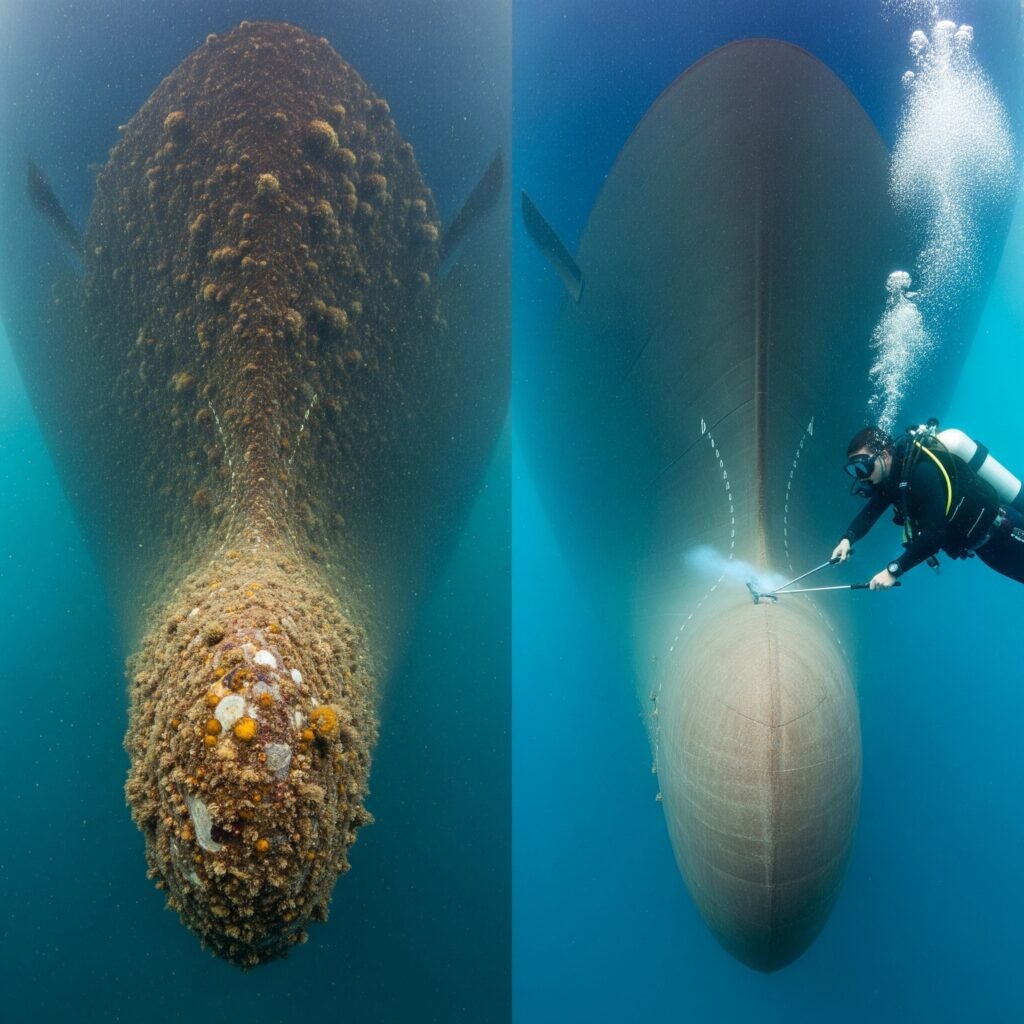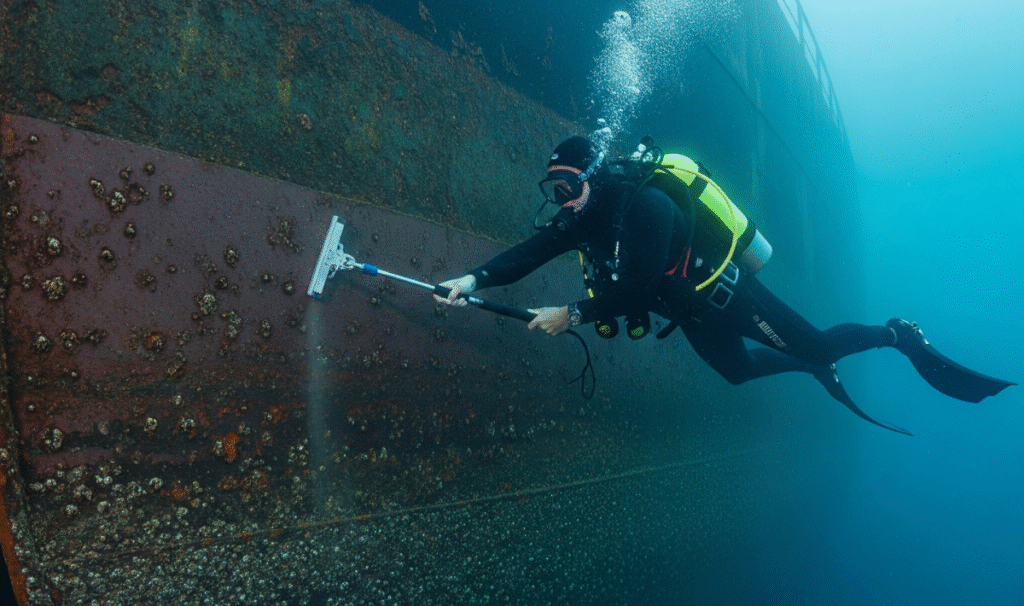Picture the crystalline Jamaican waters, where turquoise swirls kiss pristine shores, and ships glide between bustling ports framed by palm trees. The scene is idyllic, but submerged beneath this beauty lies a silent but fierce battle: biofouling, the stubborn growth of marine organisms on ship hulls. Underwater ship hull cleaning in Jamaica is the frontline defense, but it comes with risks that every mariner and shipowner should understand before diving in.
If you’ve ever dipped beneath the blue canopy off Montego Bay or Kingston Harbour, you’ve witnessed how vibrant marine life thrives here. Yet this same richness challenges ships sailing in these waters. Barnacles, algae, and marine slime eagerly stake their claim on every hull. Without periodic cleaning, experience tells us that ships quickly lose speed, increase fuel consumption, and threaten the delicate Jamaican aquatic ecosystem.
Understanding the Importance of Underwater Ship Hull Cleaning in Jamaica
The Biofouling Challenge in Tropical Waters
The Caribbean Sea, warmed by endless sun, is a breeding ground for biofouling. In Jamaica, this means a faster buildup of marine growth than in many colder regions. This biology clings stubbornly and grows aggressively. If untreated, this “drag” becomes a prison, slowing ships as if they were towing invisible chains along their route.
Why Cleaning is Both Vital and Risky
While underwater ship hull cleaning in Jamaica is essential to restore speed and reduce costs, the process is not without pitfalls. Removing biofouling improperly can harm the environment, damage hull coatings, and create significant legal and financial hazards.

Environmental Damage—The Hidden Cost of Cleaning
Release of Harmful Toxins and Pollutants
When you clean a hull underwater, you risk releasing paint flakes and toxic biocides into marine ecosystems. Anti-fouling coatings often contain copper and other poisons designed to discourage settling organisms. Disturbing these substances risks poisoning fish, corals, and even local fisheries that thousands depend upon in Jamaica.
Impact on Coral Reefs and Marine Biodiversity
Jamaica’s coral reefs are jewels of the Caribbean. Any pollution or invasive species discharge linked to careless underwater ship hull cleaning in Jamaica can suffocate reefs, damage nursery grounds, and upset ecological balance—a price too high for economic gains.
Hull Damage and Operational Safety Hazards
Abrasive Cleaning Practices and Hull Coating Loss
Cleaning needs a gentle but effective touch. Abrasive brushes or unskilled workers risk stripping the expensive anti-fouling layers designed to protect hulls from corrosion and re-growth. Bare steel means rust, faster deterioration, and expensive repairs. The financial loss here is hidden but steep.
Diver Safety and Risk Factors in Jamaican Waters
The dangers for divers in Jamaica’s warm but sometimes unpredictable waters are very real. Currents, underwater obstacles, and marine life interactions require certified teams with rigorous safety protocols. Sadly, accidents and near-misses happen where standards slip, making professional certification (like from IMCA) critical for safe underwater ship hull cleaning in Jamaica.
Compliance and Regulatory Risks
Navigating MARPOL, IMO, and Jamaican Regulations
Jamaica follows international maritime environmental law tightly, embracing the MARPOL Convention (Marine Insight – MARPOL Convention) and IMO (International Maritime Organization) safety frameworks. Failure to comply during hull cleaning—such as illegal debris discharge or poor documentation—can trigger heavy penalties.
Fines, Operational Shutdowns, and Legal Battles
Port authorities in Kingston and Montego Bay are vigilant, with powers to detain vessels, issue fines, or halt operations. Legal battles can follow non-compliance, and reputational harm can be career-ending in the close-knit Caribbean maritime community.
Best Practices for Mitigating the 3 Critical Risks
Smart shipowners:
- Engage IMCA-certified, highly trained cleaning crews.
- Choose eco-friendly cleaning systems with debris and toxin recovery.
- Schedule regular, preventive hull cleanings to avoid heavy buildup.
- Keep thorough records, including photographic evidence and waste logs.
- Stay informed on changing Jamaican and international maritime laws.
Implementing these actions transforms underwater ship hull cleaning in Jamaica into a source of strength, not liability.

International Guidelines and Standards: IMCA, IMO & MARPOL
International bodies set the gold standard for safety, quality, and environmental protection during hull cleaning. IMCA governs diver training and operational safety, IMO enforces pollution controls, and MARPOL demands strict waste management. Jamaica’s waters benefit hugely when these standards are embraced by all providers of underwater ship hull cleaning in Jamaica.
Why Jamaica’s Unique Marine Environment Amplifies These Risks
Jamaica’s coral reefs, mangroves, and economic dependence on clean seas create heightened stakes. Warm tropical water accelerates fouling growth and complicates cleaning operations. Nearby protected areas require even stricter environmental mindfulness, ensuring the risks of underwater ship hull cleaning in Jamaica are taken seriously by all players.
Conclusion:
Maintaining a ship’s hull beneath Jamaica’s waves is about more than technical upkeep. It’s an environmental promise, a financial necessity, and a professional responsibility. The underwater ship hull cleaning in Jamaica coalesces around ecological impact, material damage, and legal compliance. Managing these smartly means safer seas, sharper vessels, and sustained success for all who sail the Caribbean’s sparkling waters. With CleanShip.co, shipowners gain access to certified divers, eco-friendly technology, and compliance-focused solutions that ensure hull cleaning supports efficiency, protects marine ecosystems, and keeps vessels operating at peak performance across Jamaica’s busy maritime routes.
FAQ:
Q1. How often should underwater ship hull cleaning in Jamaica be done?
Most vessels benefit from biannual cleanings, but high-fouling routes or slow cruising schedules may mean more frequent maintenance.
Q2. Are environmental waste controls mandatory during underwater hull cleaning in Jamaica?
Yes, debris must be captured and disposed of responsibly, following MARPOL and IMO guidelines plus local regulations.
Q3. What certifications should cleaning teams have?
IMCA certification is the global benchmark for skilled, safe, and compliant cleaning crews in Jamaica.
Q4. What are the safety risks for divers working in Jamaican waters?
Diving hazards include currents, boat traffic, underwater obstacles, and marine life. Proper training and monitoring are vital.
Q5. Can robotic hull cleaning equipment be used in Jamaica?
Yes, remotely operated vehicles and magnetic scrubbers are increasingly used for efficient, safe cleaning in deeper or dangerous areas.


